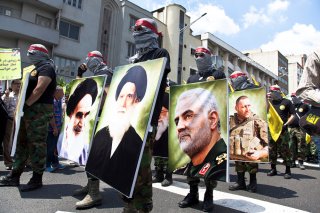The U.S. is Repeating Cold War Mistakes with Iran
The notion of Iran as a prime mover—the initiator of regional evil—is just as misleading as it was with the USSR during the Cold War.
Also, like the Soviet case, the notion misses how much Iranian behavior is not initiation but instead a reaction to the actions of others. Terrorist attacks by Iranian-allied groups against Israel have been attempts to retaliate for Israeli terrorist attacks against Iranians. An attack on Saudi oil facilities was a response to U.S.-led efforts to shut down Iran’s oil trade. The most significant Iranian attack on a U.S.-manned installation in Iraq was direct retaliation for the U.S. assassination in Iraq of a prominent Iranian military and political leader.
And everything done in the region, by Iranian allies or anyone else, over the past three and a half months that is connected to events in the Gaza Strip is a reaction to what Israel is doing in Gaza. Iran has been fine-tuning its own reaction to continue posing as a champion of Palestinian rights while respecting mainstream Arab views on the subject. This has included acquiescing to Arab resolutions and statements favoring a two-state solution in Palestine.
As with the U.S.-Soviet Cold War, fixation on the confrontation with Iran distorts U.S. policy toward other countries that pose their own problems for U.S. interests but are seen as being on the good side of that confrontation. One example is the U.S. solicitousness of Saudi Arabia, which has thrown its military weight around in more destabilizing ways than Iran, is at least as authoritarian as Iran, and whose deadly violations of human rights have touched U.S. interests.
Another example is Israel, for which the even greater U.S. solicitousness has additional roots—and now greater costs, including U.S. association with the humanitarian catastrophe in Gaza—and whose governments have made unrelenting promotion of hatred and isolation of Iran a major facet of Israeli foreign policy. Emulating Nguyen Van Thieu’s sabotaging of possible peace agreements with North Vietnam, Israel has sabotaged possible agreements with Iran to the detriment of U.S. interests, nuclear nonproliferation, and regional peace and security.
Amid all the similarities, in one respect, the application of the Cold War model to Iran is even worse than its application to the Soviet Union. The USSR, after all, was a nuclear-armed superpower, the lodestar of an ideology with broad appeal, and a genuine global competitor of the United States. Iran is nowhere close to being this. It is a mid-level power with a partly decrepit military, no global reach or presence, and limited appeal even in the Middle East as a largely Persian and Shia nation within a mostly Arab and Sunni region. Future historians will marvel at how much the United States of the current era allowed this one distant and lesser state to become the centerpiece of so much American thought and policy.
Paul R. Pillar retired in 2005 from a twenty-eight-year career in the U.S. intelligence community, in which his last position was as the National Intelligence Officer for the Near East and South Asia. Earlier, he served in a variety of analytical and managerial positions, including as chief of analytic units at the CIA, covering portions of the Near East, the Persian Gulf, and South Asia. His most recent book is Beyond the Water’s Edge: How Partisanship Corrupts U.S. Foreign Policy. He is also a contributing editor for this publication.
Image: Shutterstock.com.

